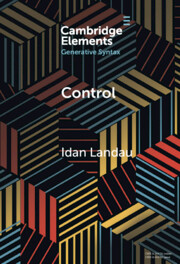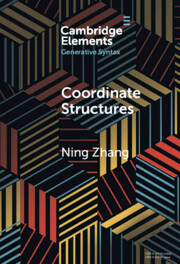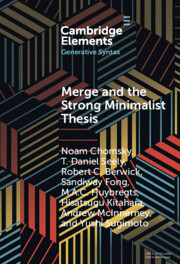About this Elements Series
In the mid-1950s the study of natural language syntax underwent a revolutionary shift in focus from the description of sentences to “the principles and processes by which sentences are constructed in particular languages”, as syntax was defined in Syntactic Structures (1957). This new perspective aligned linguistics with the natural sciences (which are concerned with the underlying principles and processes that animate the natural world). The study of generative grammar that blossomed from this work in the early 1950s and 1960s has flowered into a field of research with enormous breadth and depth. This series presents what has been learned about natural language syntax over the past sixty-five years, focusing on underlying principles and processes, how these apply across a broad range of languages, and where this research may be heading in the future (including what outstanding questions remain to be answered).
This series covers the core of syntax (operations and their combination in derivations of the structures they generate, including general principles that constrain these operations and structures). It also addresses the interfaces between syntax and other components of a grammar: the lexicon, semantics, and phonology. Additional volumes will address related topics, including diachronic syntax (the evolution of languages across time), the acquisition of syntax (the evolution of language within the individual), experimental syntax (the evaluation of speaker judgments, the empirical basis on which theories and analyses are constructed), computational approaches to syntax (a perspective that has been fundamental to syntactic research and the formulation of theories since the beginning), and an overview of the conceptual shifts that have occurred in the history of modern syntactic theory, still ongoing.
This series would be ideal for graduate students and established researchers in the field of syntax, while at the same time providing a presentation of a topic that could be accessible to a wider audience with a basic understanding of generative syntax.
Elements in Generative Syntax will address the following questions:
- What are the key concepts of syntactic analysis?
- What are the major areas of research to which these concepts apply?
- What are the principal findings of the research?
- What are the implications of these findings for the field of syntax and the study of language?
- What are the unanswered questions and potential new avenues for research?
- What are the key readings?
Elements in this series
About the Series Editor
Robert Freidin is Professor of Linguistics emeritus at Princeton University. His research throughout his career has focused on syntactic theory, especially as applied to cyclicity, case and binding, with special emphasis on the evolution of the theory from its mid-twentieth century origins and the conceptual shifts that have occurred. He is the author of Adventures in English Syntax (Cambridge 2020), Syntax: basic concepts and applications (Cambridge 2012), Generative Grammar: theory and its history (Routledge 2007), and Foundations of Generative Syntax (M.I.T. Press 1992). He is the editor of Current Issues in Comparative Grammar (Kluwer 1996) and Principles and Parameters in Comparative Grammar (M.I.T. Press 1991); a co-editor with Carlos Otero and Maria Luisa Zubizaretta of Foundational Issues in Linguistic Theory: essays in honor of Jean-Roger Vergnaud (M.I.T Press 2008) and with Howard Lasnik of Syntax: critical assessments (6 volumes) (Routledge 2006).
Editorial Advisory Board
- Misha Becker (UNC Chapel Hill)
- Doreen Georgi (Universität Potsdam)
- Tim Hunter (UCLA)
- Laura Kalin (Princeton University)
- Hisatsugu Kitahara (Keio University)
- Ivona Kučerová (McMaster University)
- Howard Lasnik (University of Maryland)
- A. Carlos Quicoli (UCLA)
- Ian Roberts (University of Cambridge)
- Jon Sprouse (NYU Abu Dhabi)
- Susi Wurmbrand (University of Vienna)
Contact the Series Editor
If you would like more information about this series or are interested in writing an Element, email Robert Freidin at [email protected].



